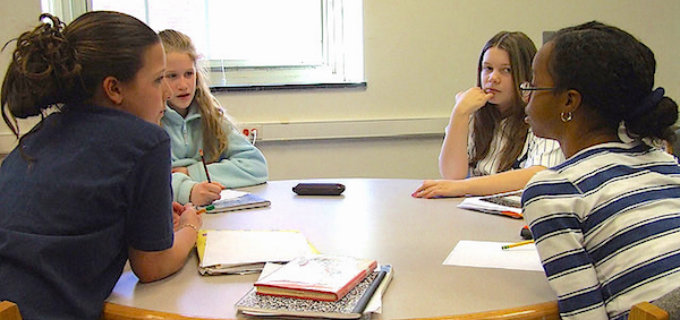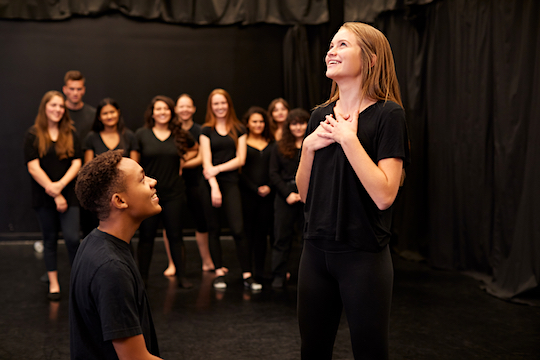Tips for Integrating SEL in 5 Middle Level Subjects
By Kasey Short

CASEL – the Collaborative for Academic, Social, and Emotional Learning – describes this as “…the process through which all young people and adults acquire and apply the knowledge, skills, and attitudes to develop healthy identities, manage emotions and achieve personal and collective goals, feel and show empathy for others, establish and maintain supportive relationships, and make responsible and caring decisions.”
Incorporating SEL across the curriculum increases opportunities for students to learn these vital skills, creates a positive classroom culture, and helps students see the connections between SEL skills and academic content.
How do we accomplish this in our everyday practice? The content specific activities and questions below offer some examples for seamlessly integrating SEL skills and content area objectives in English, Social Studies, the Arts, Mathematics and Science.
English Language Arts
Examining Characters
Examining the emotions, values, dialogue, and choices of fictional characters encourages empathy, understanding, and self-awareness. It also provides students an opportunity to consider the impact of a character’s choices on specific outcomes. The questions below can be applied to most fictional characters and serve as a jumping off point for these conversations.
✻ How do you think the character feels? Use examples from the text to explain why you think they feel that way.
✻ Explain a moment when a character had a strong reaction to a situation. Based on the reaction and what you know about the character, how do you think they felt in that moment?
✻ What does the character value? How are their values similar and different than your own?
✻ What can you learn about the character based on their dialogue?
✻ What examples of dialogue convey the emotions of the character?
✻ What is a significant choice that the character had to make within the story? What are the pros and cons of their choice? Would you make the same choice or a different one?
Speaking, Listening and Questioning
Creating time and space for students to have meaningful conversations, disagree respectfully, ask questions, and convey emotions through discussion allows them to develop social and emotional skills as they study language arts and literature.
To facilitate this in my classroom, I encourage questions and provide consistent opportunities for both whole group and small group discussions.
The articles linked below provide more specific examples and activities that I use:
► Establishing a Culture of Questioning
► More Talking in Class Please
Reading Aloud
Reading aloud to middle school students has many academic as well as social and emotional benefits. The article below outlines how I implement reading aloud in my middle school classroom. This year I started
► Reading Aloud to Middle School Students
Social Studies
Historical Figures
When examining historical figures, students can consider how they think the person felt at a particular time or during an event and then continue that thought process by analyzing how that person’s feelings and emotions may have impacted their actions based on primary sources and historical accounts.
See the article below for specific ideas on examining female poets to better understand history. It asks students to examine not only the historical context of the poems but the emotions and experiences of the poets.
► Studying Female Poets to Understand History
Emotions Impacting Change
Strong emotions and passions have led to positive change and outcomes throughout history. When studying protests, activism, and other means of societal change, ask students to consider the emotions, feelings, and motivations of the leaders who impacted change. This will provide concrete examples of how one might channel emotions in promote positive outcomes.
Current Events
There are often many strong opinions and emotions around current events. Providing students an outlet for sharing their ideas and teaching them to listen to the ideas of others helps them develop social and self-awareness skills. My article below outlines one project that encourages students to explore critical questions about current events and share their ideas. It was designed for hybrid teaching but could be easily adapted to full in-person instruction.
► Using Elevator Pitches to Explore Critical Issues
The Arts
Drama
Drama provides an excellent opportunity for students to practice role play through improvisation exercises. Examining and interpreting what a character is feeling or thinking based on their dialogue encourages students to consider the impact of words on others and how what someone says connects to how they are feeling.
Analyzing Art and Music
The questions below can be used as part of a music or arts curriculum to help students analyze what they think the artist felt when creating the piece, consider their own feelings, and develop empathy and understanding for others.
✻ How do you think the artist felt when creating this piece? Explain why.
✻ How does this piece of art/music make you feel? Explain why.
►Compare and contrast the different feelings of students and discuss how even though everyone experienced the same art/music, different people felt differently.
✻ Which piece of art/music do you connect with? Explain why.
✻ Did listening to this piece of music change your mood? Explain.
Creating Art and Music
Writing, designing, and creating music and art is an excellent way for students to express their own feelings. Asking student to create art or music that represents their mood and/or feelings provides them an opportunity to think about and express their own feelings. They can take it a step further and share not only their art or music with their peers but also the thoughts and feelings that went into the creation.
Mathematics
Group Problem Solving
When students work in groups to solve complex math problems, they are simultaneously practicing their math skills, relationship skills, and teamwork.
Reflection
►When there are multiple ways to solve one math problem, ask students to demonstrate as many ways as they can find to get the correct answer and then reflect on which one worked best for them and explain why by focusing on their strengths and challenges.
►Have students take time to explain their mathematical thinking and choices when solving work problems. This can be especially helpful after students receive back graded assessments and can reflect on strengths, challenges, and goal setting.
►Create word problems that present real world issues and data. Ask students to reflect on ethical responsibility and their thoughts and opinions about the data they discovered through completing the math problem.
Science
A curriculum that focuses on ethically responsible science offers a multitude of opportunities to encourage students to consider science as value-laden not value-free. By analyzing data, evaluating outcomes and impacts, pursuing scientific controversies with curiosity, exploring the impact of technological development on society, and studying the climate crisis, students add an SEL dimension to their scientific thinking.
Technological Development Questions
✻ How do technological advancements impact societies, civilizations, and individuals?
✻ What technology advancement would you be interested in exploring?
✻ What advancement do you hope will be made in the future? Why?
✻ Do scientist have an ethical responsibility when they conduct research?
✻ How do scientists use data to make decisions?
Climate Change Questions
✻ How does climate change impact our lives and the lives of others?
✻ What responsibility do we have to combat climate change?
✻ What do the data and research say to you about potential future impacts of climate change?
✻ Do you think climate justice is achievable?
✻ What would you like to learn more about climate change?
► A Real World STEM Project: Plastics Pollution
Kasey Short (@shortisweet3) loves to share ideas from her classroom and writes frequently for MiddleWeb. She attended the University of North Carolina at Chapel Hill and earned a bachelor of arts in middle school education with a concentration in English and history. She went on to earn a master’s in curriculum and instruction from Winthrop University. She is currently the Director of Studies at Charlotte (NC) Country Day School and an eighth grade English Teacher.





































As a middle school PE and Heat teacher I am sad at my subjects being left out. We often are. We also incorporate SEL into our classes. We use teamwork and sportsmanship throughout each class, EMPHASIZING a variety of Social-Emotional skills. Such as playing on a team with people you want to fight or scream at, learning to be OK with your body and not make fun of others (body shaming), giving compliments and being honest, and so much more.
Thanks for commenting, Lesli. We’d welcome an article from you on this theme! Kasey was writing about subjects she’s most familiar with – we need voices from across the curriculum! Get in touch via askmiddleweb@gmail.com